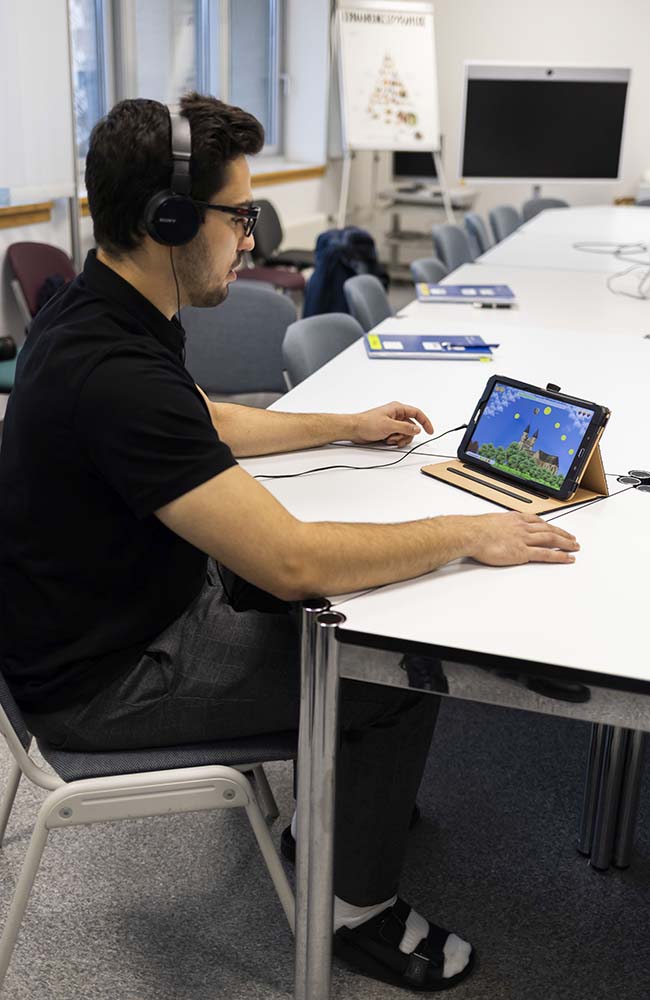Video game accurately predicts risk of falling
A research team from the University Clinic for Renal and Hypertensive Diseases, Diabetology and Endocrinology at Otto von Guericke University Magdeburg has developed an intelligent video game that can precisely recognise the risk of falls in older adults with diabetes. Falls are one of the most common causes of injury and hospitalisation. People with diabetes in particular are at increased risk, as nerve damage, impaired balance and loss of muscle strength - typical side effects of the disease - impair their mobility. The novel method combines video games with sensor-based insoles that record detailed movement patterns and pressure distributions. The study showed that the video game-based system can predict falls with an accuracy of over 80 per cent - a significant improvement over traditional mobility tests. The results were published in the renowned specialist journal EClinicalMedicine.

Photo: The research team led by study director and clinic director Professor Peter Mertens (1st from left). Photographer: Sarah Kossmann
‘Traditional tests such as the so-called ‘timed-up-and-go test’ often overlook subtle early warning signs, especially in people with diabetes and nerve damage,’ explains study leader Prof Peter Mertens, Director of the University Clinic for Renal and Hypertensive Diseases, Diabetology and Endocrinology Magdeburg. ‘Our method is not only more accurate, but is also perceived as entertaining and motivating by the participants.’
The new system offers valuable support for older adults, relatives and carers. By accurately identifying the risk of falling, preventative measures can be taken, such as removing tripping hazards in the home or adjusting doses of medication that could affect balance.
The study involved 152 older adults with diabetes, a group with a particularly high risk of falling due to nerve damage, impaired balance and reduced muscle strength. During a 15-minute video game session, which could be played either sitting or standing, the participants tested important skills such as reaction time, balance and muscle control.
The sensor-supported insoles provided detailed data that was analysed using artificial intelligence to determine the individual risk of falling. The accuracy of the system was 82.8 per cent in sitting mode and 88.6 per cent in standing mode - significantly better than the approximately 50 per cent accuracy of conventional methods.

Photo: Demonstration of the innovative insole: During a 15-minute video game session while sitting or standing, the study participants tested their reaction time, balance and muscle control. Photographer: Sarah Kossmann/University Medicine Magdeburg
The research team plans to further optimise the technology and push for certification. In the future, the video games could be used in doctors' surgeries, care facilities or rehabilitation centres to prevent falls and improve the quality of life of older people.
The project was funded by the Ministry of Science, Environment and Energy of Saxony-Anhalt and the European Regional Development Fund.
Original publication
Antao Ming, Tanja Schubert, Vanessa Marr, Jaqueline Hötzsch, Sebastian Stober and Peter R. Mertens. Video game-based application for fall risk assessment: a proof-of-concept cohort study, in: eClinicalMedicine 2024 Nov., DOI: https://doi.org/10.1016/j.eclinm.2024.102947
Scientific contact
Prof. Dr. Peter R. Mertens, Director of the University Clinic for Renal and Hypertensive Diseases, Diabetology and Endocrinology, Otto von Guericke University Magdeburg, Tel.: +49-391-6713236, E-Mail: peter.mertens@med.ovgu.de






